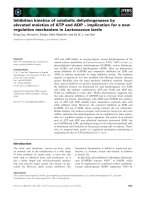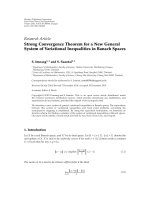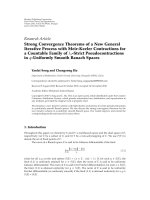Stiegler for a new critique of political economy (2010)
Bạn đang xem bản rút gọn của tài liệu. Xem và tải ngay bản đầy đủ của tài liệu tại đây (8.43 MB, 158 trang )
-
•
-Critique
f ;: .f
Politi
I
no my_
-
Bernard Stiegler
For
a
New Critique of
Political Economy
BERNARD STIEGLER
translllttd by
Daniel Ross
polity
AN .,..t.It.hnl ... """', .... _wi/,«i,,,,... M 1"-., i*u
..... C fA,t;"", G..Ii!h.
100'1.
t-., n-,* " "'-".,.I'IIfU1'tft.... 0 I"nut'! Soqln. !OlD.
lhl. ".wI'"
••rufoIIi uu It � d� Mini,",," ID�. do b c..d.�,.......G.n,.., ....;.,.,.,1
dw 11m:
I'ublir.htd wl,h .1.. ,
..ioAn," "(,h< ':l'<'IJI'h M,n.....,.v(CUltuI'<'-N..Io..... Ccno,., r".
,.....
!'nl111 I'......
Ii) HridfIr 5,.....
Coonbridp- CIIlIIJR. UK
""lh1"""-'
nu /1,'.10, S,.....,
M,Idm, Mil O!, �8, USA
All ria'''' 1n<1_t. b«I" rlll ,M q....,.,lon nf"""" � ro, .hol"""""'o(
t,hld"" .lIIt "",kw. ,,0 p.m "(,hi> »UI>I'a,I,.., ""1 lit. '.p'uJ...:to1. 'm.ro ""
M.k\-.I 'Y"enl.
ISBN-IJ: '178.o-7�5()...j8nH Ilwdl»dt)
ISBN. I]: '78.o-7�5()...jJG.I·O ,,,,,prrback}
II CI� m:cm.I � ,hlro '-" Il_lloblt ffWII.ho BrI,iJo Ubr>.t)'
I lIN! IS pt ��
br Sn.-b AI...."... .. tal. s....:.p
Tl'J'C'<" in
Tho: publilIhn hat w....! ... ..... mdea...... ... o"""rr ,Iw ,hr URu rOf .",..
ruI .....t..i ,..
.....,m! ,0 Ito ,hi. .... UC'a>I..... ..... ..:t;..,.II ,"" ,imo of....... 10 pono. �,
II.. pIIbIi'" hao lin �Ii.,. .... ,he wdool.... :ond eon -"c no punm
n.;
.. I,..., 1>1' ,h., 1"'= Nnl<'l' 1'(>1 will rrmaln .ppooptll•••
"
ft.'nJ' cIIi>n hao ....... INdo tv ,r",o.1I ."""rlP" ho4dcn. bu, if...,. ha.� .......
•nod....m'/rOYUlookn!
.
,hr publiohn wlU hr pit-.! II) 1",,1...k ony nctawy .mli"
In .ny.ub..t.:tUCft1 rtllri",,,. �,,;"n.
Fo. fu nh.. lnr"""'tion On 1'011.,.. vi.., 01" .....t..,,�: .._.poIi'Y......,m
...
CONTENTS
For a New Critique of Political Economy
1
Heads buried in the sand: a warning
3
Incroduction
8
Pharmacology of the prolt!tariat
14
To work
45
Pharmacology of Capital and Economy
of Concriburion
71
Nom
130
IllIux
143
For a New Critique of Political
Economy
For An/fluid ck I'Epilu Imd Chris/itlll rlmri
ONE
Heads buried in the sand: a
warning
lhe [hests put forward in this small volume were hrst
set aU( on January 15. 2009 at the Maiso" de I'Ettrope,
during a lecture which tvdyne Grossman and the
Co/Mgt inrffllat;onal dt ph;[osopbit invited me (0 deliver,
and they wert also discussed in my conrribution 10 the
catalogue for "Work: Meaning and Care," an ohibi
tion held in Dresden from June 2009 to March 20 I 0
at the initiative of the Demsches Hygiene-Museum,
the German Fedtral Cultural Foundation and Daniel
Tyr.addlis.
1 decided (0 publish these rdlecdons in the midst of
economic and political debates taking pla� throughout
the world about the necessity of implementing stimu
lus plans in order [0 limit (he destructive effects of the
first planc:tary economic crisis of the:: capitaliSt indus
uial world. Now when, in such debates, "investment
stimulus" and "consumption stimulus" arc: spoken of
in opposing [enns,
twO
distinct qucsrions become con
fused, questions that, in fact. do require simultaneous
treatment, yet according to
twO
different scales of time,
3
f O R A NEW C R I T IQUE
:l
difficulty which is all the greater. given that
th� pmmt
crisis hmdds tlu /'lid o/Ihi' COlJJllmm'sl modi'l.
Those\.'ho advocate srimuladng consumption as Ihe
pouh to economic rccovery want ndlher ro hear nor
speak about the end of consumerism. But the French
government, which lldvocoues stimulating investment.
is no more willing Ihan those who advocalc stimular·
ing consumprion to C.11l [he consumerist indumial
model inw question. The Frcnch version of"stimularing
investment" (which seems morc suhtle when it comes
from Barack Obama) argues that the best way
(0
5.1Ve
consumption is through invesrmenr, rh:tt is, hy restoring
"profitability," which will in
rurn
restore an entrepre·
neurial dynamism itself founded upon consumerism
and its counterpart, marker·driven productivism.
In other words, this "investment"' proposes no long.
term view capable of drawing any lessons from the
collapse of an induStrial mood based on the automobile,
on oil. and on (he consrruction of highway networks. as
well as on the Hemien networks of the culture indus·
tries. This ensemble has until recendy formed me basis
of consumerism, yet today it is obsolete, a faCt which
became clear during the autumn of 2008. In other
words, this "invcstment" is not an ilwesrmenr: it ison the
contrary a
disillvmmml, an abdication which consistS
in doing no more than bllryil1g011�S h�ad hI th� WId.
4
Ht'ads bUTi,.d in II" sand: II wllmillg
This "investment policy," which has no goal other
than the reconsotmion of the consumerist modd, is
[he translation of a moribund ideology, desperatdy
(rying to prolong the life of a model which has b«ome
self-destructive, denying and concealing for as long as
possible the faCt thar the consumerist model is now mas
sivdy toxic (a [oxiciry extending far beyond the question
of "toxic assets") because it has re'J.ched its limitS. This
denial is a matter of trying, for as long as possible, to
maintain [he colossal profits that can be accrued by
those capable of exploiting iI.
The consumerist modd has rcached its limirs because
it has become systemically short-termist. bCC'J.use it has
given rise to a tyJUmic Slupidity that
Ult
T«omtitution of a
strufturally prtVt'f//S
kmg-tmn horizon. This "invest
ment" is not an investment according [0 any terms other
than those of pure accounting: it is a pure and simple
reestablishment of me st,Ue of things. trying to rebuild
the indusrrial landscape without at all changing itS ncuc
rure, still less its axioms, all in the hope of prorecting
income levels that had hitherto been achievable.
Such may be the hope, but these:: are the false hopes
of those with buried heads. The genuine obj�t of debate
raised by the crisis, and by the question of how
(Q
escape
this crisis, ought (0 be how to ovcrcome the short
termism to which we have been led by
a
consumerism
5
FOR A NEW CRIT1QUE
intrinsically destructive of all genuine investment-that
is, of investment in the furure-a short-term ism which
has
Jysuhlically, and 1l0t acddmtfllLy, been translated into
[he thcomposition ofillvestnltnt into tprculdriol1.
Whether we must, in order
(Q
avoid a major eco
nomic catastrophe, and to anenuate the social injustice
caused by the crisis, stimulate consumption and the eco
nomic ma<;hinc SItch
as il slill is, is a question as urgenr as
it is legitimate-as long as such a policy does not simply
aggravate the situation at the COSt of millions and bil
lions of euros or dollars while at the same time masking
the true question, which is to produce a vision and a
political will capable of progressively
moving away from
the uOl1omico-politictlL compLex of C01l1llmp'ioll so asJO
enter into the complex ofa new type of il1Vf!Jtment, which
must be a social and political investment or, in other·
words, an investment in a common desire, that is, in
what AristOtle called philia, and which would then form
the basis of a new type of economic investment.
Between the absolute
imposes
the
imperative
urgency which obviously
of salvaging
the
present
situation-and of avoiding the passage from a global
economic crisis to a global political crisis that might
yet unleash military conflicts of global dimensions
and the absolute necessity that consists in prodUCing a
potential future in the form of a political and social will
6
Hmds buried ill tl;r sand: a wamillg
capable: of making a break wirh the: presc=nt situation,
there: is dearly a conrmdictioll. Such a contradiction is
characte:ristic of what happens to a dynamic system (in
this case, the: industrial system and the: global capitalist
system) once it has begun to mutate.
This question is political as much as it is economic: it
is a question of political economy, a matter of knowing
in whatprrciJt!/y this 1fIflflU;Oll co nsim. and to what potit.
iol, bur also industrial. choices ir leads: it is a matter of
Itnowing what nt!tv indus/rial poli/ics is
reqllirtd (on
this
point at least. Samck Obama seems slightly ahead of (he
Europeans, who remain expertS at functioning in a stale
of denial).
Only such a response is capable of simultaneously
dealing with the question of what urge:nt and immedi·
ate steps are: nc=c�sary in order to salvage: the industrial
system. and with the question of (he how such steps
must be inscribed within an economic and politi.
cal mutation amounting [0 a revolution-if it is true
that when a model has run its COlirse [revolu], [hen its
transformation, through which alone it can avoid [Oral
destruction, consdrutes a revolution.
7
Introduction
RetentionaL economy
In 200 1 I argued, in La Ttclmiqll� n I� T�mpJ 3: U
r�mps dJI dnbnn �11a qU�lIi(m dll mnl·tlT�. and by way of
reading Kam's Criliqllt ofPurt RtaJon. for a n�w critiqut".
for a critique addressing the question of tertiary reten·
tion. that is, (he question of mnemotechnics-and in
more general terms addressing lhe question of technics
which, qun maurinliZdrion ofaptritnn, always consri·
rutes a Jpatia/;zalion of th� tim� of comciOUSl1tsJ bryond .
comcioltJntJJ and. thetefore. consrirutes an unconscious·
ness, if not Iht unconscious. I would like to demonstrate
here that (his question of tertiary retemion opens up a
new perspective on political economy and its critique,
and, now more than ever. that it makes a new critique of
political economy the essemial task of philosophy.
Conscious time is woven with what Husserl calls
retentions and proremions.1 Primary retemion is that
which is formed in the very passage of time, as the course
of this rime, such that, as a presem which passl!S, it is
8
ImToduCliolf
constituted by the immediate and primordial retendon
(the "primary retenrion ") of irs own passing. Becoming
past, (his passage of the present is (hen consticUled
secondary retemion, that is.
(ents
as
as
all those memorial con
[sollvtnirs[ which together form the woven threads
of our memory [mimoire].
Tertiary retemion is a mnemotccnnical exteriori
zation of secondary retentions which arc themselves
engendered
by
primary retemions.
But from the
beginning of that process of hominization [hac Andre
Leroi-Gourhan describes as a process of exterioriza
tion, all technical objects constitute an inrergenerational
support of memory which, a.� mnurifll m/tllrt, overdctcr
mines learning
Inpprt'miHngnJ and mnesic activities, To
this extent. therefore. teniary retenoon always already
precedes the constitution of primary and secondary
retention, A newborn child arrives into a world in
which te((iary retention boch precedes and awaits it,
and which. precisely, constitUlCS this world
And
as
as
world.
the spalialization of individual rime becoming
thereby collective time, tertiary retention is an original
exteriorization of the mind
[npri/),
In the course of human history. however, the mne
motechnical retenrionallayer is transformed, increasing in
both complexiry and densiry. It leads in pa((icular, from
the advent of Neolithic sedcntarization, to the formation
9
F O R A NEW CRITIQUE
I
of teniary reremion systems which consritme increasingly
analytical recordings of prim ry and secondary reten·
�
tional Aows or Auxes (/IIIXI-slI Ch � systems of writing
ir that .logos is constituted:
and numeration. It is in thi� w
as the discretization of the continuous Aow of language
which, spatialized, can rhen be considered analytically,
which then enters ilHo.its diacritical era, and this
is the
point from which. fundamentally and specifically, log!c
proceeds. But this discretization of flows also affects
gestures. The discretization of gesture was given concrete
expression with the application of Jacques de Vaucanson's
automation technology to the Jacquard loom, and became
generalized in the form of (he industrial revolution.
Gesture must here be com:idcred (like speech) as a
rerentional 80w, iliar is, as a
mm:]
cOlll;nuozu chain kncbabu·
[apprmtH
i agt'J of a
of gestures, and the learning
craft consists in producing gestural secondary reren·
tions, whereas the discretization and the spatialized
reproduction of the time of gestures constitutes techni·
cal automation, but where it is no longer the
the souL but rather the gestures of the
logos
of
body that become
analytically rt'prodllcibit' as tertiary ret�ntion. This rero
dudbiliry resultS in (cremional grains that one can call
gramnlt'S. And this is why we posit chat the evolmion of
terriary retemion, from the Neolithic age until our own,
constitutes a process of grammati7.arion.
10
Introduction
In the course of the nineteenth ce::nrury, technologies
for grammati1.ing alldiolJiSllalIrruption appear, through
which the:: Rows of the sensory organs are discre
rized. All noctic, psychomotor and aesthetic functions
then find themselves transformed by grammatization
processes. Considered in terms of political economy,
this amoums to (he facr that it is the functions of
conception, production and consumption which are
grammatize::d-and whi�h are thereby incorporated inlo
an apparatus devoted (0 the production of tertiary
retentions controlled by mrmionnl sysrcms.!
7h( work ofgrammatization
I would like to show mat:
•
the question of tertiary retention. engendered as it
is in the course of rhe process of grammatization, is
the condition of rhe proletarianization described by
Marx and Engels in the Communist MnniftsfOi
•
new forms of grammalizarion, unknown to Marx
and Engds, constitute new forms of prolerariani7..a
tioni
•
from this perspective, a new critique of political
economy is the task pttr
l'Xcrllrnct' for philosophy.
II
FOR
It.
NEW C R I T I Q U E
This short book proposes a brief exposition o f the con
siderarions which consrirute the basis of such a new
critique of political economy. focused around several
questions. in order to open a debate with Marx, and
on the question of labor and work today-given that
labor. which firs! ap�ars with sedentarization. is always
overdetermined by the 5t'ate of grammatization which is
current at the time. and given that grammatization_is,
at present. undergoing new and literally revolutionary
developments.
lhe essential aspects of this exposition are the
following:
•
the
qutSrioll 0/ production.
OIL
a moment when we
.
,
are entering imo a new economic and industrial era
which, faced with the larest developments in gram
matization. poses anew �he question of tht
dtfinirioll
of labor:
•
the
qlltSriol' 0/ consumptioll,
unable to foresee, which
was
and of what Marx was
the way in which con
sumption would be reconfigured in the twentieth
century in an essential relation to desire and to its
economy-in an essemial rdation to what, through
the pathway
to
the imaginary, that is. to fantasy.
and through that to the unconscious. transforms by
binding to the material of the drives;
12
/mrotiucrioIJ
•
the qJINtioll of tlJl' prolrtorint, of the unde.rsranding
and extension of this concept, of its uses and misuses
in the. Marxist tradition, of its being forgonen, and of
its imml'lur imponallcl' today.
•
the qu�rioll ofilldustry and irs inscription in human
becoming.
considered
from
the
perspective
of
grammatizarion;
•
the QlltJt;Oll of I'xurfla/itit's, such as these arc inces·
sandy reconfigured in the course of the: process
of industriali7.ation. insofar as industrialization is a
process of grammatizadon, and in ,heir rdarion to
tr.msindividuation. tbat is, to (011mll'rcr,
•
the: qucstipn of
social cltum in
the: framework of
a
new proletarianization, of (be disappearance of what
one calls me bourgedisie---pc:uy, middJe or grand
and the stakes of a becoming.mafia of capitalism.
13
TH REE
Pharmacology of the
proletariat
From commtrct to tht marktt
One hundred and lifty years ago, in January 1859. Man:
published his
Eco1lomy,
Comriblllioll to a N�UJ Cr;tiqll� ofPolitical
and hence when I argue here for a new cri
tique of political economy. I am also commemorating
this annivcrliary. But. at the same time, I am paying
homage
(0
the journal, lJJ
Nollvtllr Critiqlli', about
which I spoke in September 2008 ar an annual event
sponsored by the n�spaper
L 'Hllmanitl, I
describing
the place this journal holds in my personal history as an
adolescent and young militant: it was in the pages of this
Communist Parry publication that for the first clme I
read about psychoanalysis, linguistics, anthropology and
philosophy.
Finally. and above all.
new
critiqui',
in
speaking
today
about a
I am engaging in polemical dialogue
with an intellectual tradition which is very much my
own, emerging from French philosophy in the second
half of lhe lWentielh cen£Ory. and which. as POSI14
Phl1.rmnco/.Qg offh� pro/�fllriflt
mucturaHsm-following Barthe:s. author of Criticlll
EsstlJs, and about whom J also heard for the firs! time
in La NOllwll� Crifiqllt'--posited thar cririque was a
concept insepardble from metaphysics. that it was to this
extenr itself metaphysical, and that. henceforth, it would
be less a marrC't of"cririquing" than of dcconmucring.
In my own view, deconstruction remains a critique,
and it is as such that it fC'mains invaluable. Bur none
of this is very dear, and J would say that, in a way,
deconstrucrion failed to critique its critique of critique,
failed, that is, to critique the claim that the form taken
by critique has historically been metaphysical. In other
words, it has not clarified what a critique might be w�rt
it no longrrfolmd�d 011 tl sJlttm ofoppositiolls.
What do I mean when I speak of having to
stttr/
afr�sh in the critique of political economy? And firsr
of all, what is political economy? J will nor in faCt give
any kind of detailed answer to this question, which
has in any case already been meticulously explored
.
by Gido Berns. J will restricr myself to pointing our
mar, whereas Berns relates the definition of political
economy given by Ancoine de Monrcbrcsrien in 1 6 1 5
(according t o which it refers
to
an economy surpassing
the domestic sphere of the oi/(os) to the question of com
m�rc� formulated by Arnould in 1 7 9 1 , in this work here
iris a marter of a political economy w/Jich is
I/O
15
longtr
FOR
A NEW CRITIQUE
$tricr/y ('omm�rdal. if it is ffUt:: that comm� is a type
of exchange irreducible to what happens to the markn
when industrializ.ation and mechanizarion create ne\v
forms of t'xchangt'.
Commerce is always an exchange of rauojr1ajr�
(knowledge of how to make or dol and UltJ()iN);Ur�
(knowledge of how [0 live). It is in this same senst'.
furthermore, that "commerce" may, in French. refer to
conversarion and mort' gener:llly to all forms of fruit·
ful social rdation. On the other hand. however. the
COIIS/wlt!r;;t market prcsuppost!S the liqUidation of borh
UlllOir1i'ir� and s(tlIoir·viun. (The difference berween
commerce and the market was recently affirmed and
explored by Franck Aggeri. Olivier Favereau and
Armand Hatchud at a colloquium in Cr:risy.la.Salle
..
•
L activit! marchal1d� SlutS I� mllrchP.')2
Philosoph",. "onomy. and ilkology today
In the spring of 2008. tvdyne Grossman invired me to
speak at the Col/}g� ;nunlllf;onal d� phjlosoph;�. and I
suggested speaking on [ht' [ht'me which forms the tide
of the present work, because I
was
convinced that we
were on [he verge of an unprecedented crisis, a crisis
calling liS meh for a
16
n�w
critique of political economy-
PI}(lrmnco/ogy oft/� protrffln'af
the specifics of which I analyze in greatcr detail in Pour
('11 finir IlIJt{ /a ",kro;IJItllu: QlIrtqllt'J propos;t;01Jt d'A"
l"dllltdatiJ.J
There
was
also, however. another rcason for spc:a.k.
ing about this subject: I wanted to provoke a discussion
within contemporary philosophy about the Slate of its
political discourse. given that so often, if flot indeed
most of the time, French philosophers from my own
and the preceding gencration have (wirh some notable
exceptions)" no/bing whatsoever to say about the con·
temporary economy. as if nothing new had ,tppc:lrcd in
this domain since (he end of the Second World War:
or, again,
as
if [here were a prohibition on any philo
sophical intervention in the field of economics after the
advent of "�onomism"-(he economism of rhe infa·
mow: "homo «.anomicus," since become shameful-an
cconomism which encompasses Marxism (liquidating
-me political"), leading to all those terrible mistakes of
which we are now aware.
I will try here, then,
(Q
open up a conversation with
those who come to us from this twentieth cenrury. Blit
I Would also and above all likC'
(Q invite their readers.
and among rhe laner, those who,
unlike mysdf. arC' still
)'IOung philosophers, and chose who arc not employed
•
philosophC'cs, but
who study philosophy because
they have made it their 0(;/1111: all (hose who
are nOI
17
FOR A N E W C R I T I Q U E
professional philosophers. but who are lovers
(nmntt'lm)
of philosophy and. as such. friends of wisdom-that is.
who are. as such, true philosophers.
In opening up this exchange. what I waD[ to say
before anything else is the following: the philosophy
of our rime has abandoned (he project of a cririque of
polirical economy. and this consritutcs a disastrous turn
of events. Because if it is true that economism has led
to
horrific ourcomes. neverthelcs.� the absence of a cri·
rique of raday's economy prepares oTher horrors-and
at rhe same rime leaves the coming generation tragically
unprepared. As for this philosophical abdication in rela·
tion to economics-which characterizes the an,icudcs of
so many and which amounts to a renunciation of the
an(':mpr to think their time. and wh.ich is as such a cor·
relate of the renunciation by politicians of the notion of
struggling against a Slate of things which undennines
the law-Ihis abdication was brought about by a certain
rdonion to critique. or ramer by a non·rdadon. such
that it leads to a non·rdarion to current economics
often masked by an obsessive relation to philosophical
textS devoted to the economics of the past.
Now. rhis non·rdarion, which has bc:come an occlu
sion if not indeed an outright denial. was nlso produced.
in large part. by the
snmt' promm that led financiers.
industrialists. [echnocrau and politicians to imerior-
18
Pbammcolog;y ofthe proletariat
iu certain JiNiatio1JS IH fimply givm. wlumlS thry are in
"altty IlItsuftahlabk ar/pm: they will. inevitably. reach
theit limits. and it will then become necessaty to submit
these limits to a critique, in the K:mtian sense of this
word. These processes form what used
ology." This ideology
aJ fuch:
is
[0
� called"ide
�ginning to reappear, this time
it is beginning to appear for what it is, thanks to
a vety brutal revdation of these limits. And yet, when
f.aced with such questions. philosophy remains almost
entirely mutC'.
To think and to critique political economy as com·
mmt that has become txclJllugt under the conditions
of an induStrial society-that is, that has submitted
mutation of/abor.
(0
1"0 a
a functionaliz.ation of me processes
of production and consumption. to a resultantfunction.
aliurion of focial
rtlations,
and such that they can no
longer be envisaged without mechanical tcchnology
requires aiming at the examination of both economics
and politics, and spokjng about them insofar as they are
indissociable.5
As for the political discourse of French philosophers,
rhey say practically nothing about economics. They
apeak of immigration, of Europe, or of dcmocrncy. but
they do not speak of capital, nor labor. nor induStry. nor
marketing. As for those who do speak philosophically
about work and labor-an there
arc a few-they are
d
19
FOR" N E W CRITIQUE
both inreresting and important. but they are in general
not philosophers: they 3re sociologists or economists. or
even computer sdendsrs.
7h� qu�stion ofwork
Faced wirh increases in productivity gains due to auto
mation and digitalization. and with the unemployment
[0 which [his gave rise. a major debate rook place at
[he end of the rwcnricrh cenrury on the possibiliry and
necessity of shared work. It was in this comex[ that in
France, the government of Lionel Jospin. under rhe
authority of Minister
of Social Affairs Martine Aubry.
passed a law limiting the working week to thirry-five
hours.
This law was inspired by research published in 1995.
both by Jeremy Rifkin in the United States (the French
translation of this work was prefaced by Michel Rocard)6
and by Dominique Meda in France? influenced in
rurn by the research of Andre Con., in particular his
work, Mttamorp"os�s du travail: Critiqllt d� In raison
tcoflomiqu�.8 More recendy. afrer rhe election of Jacques
Chimc in 2002, questions were taised, in the first place
by the Minister of Culture Jean-Jacques Aillagon, about
the role of Unedic {the French unemploymenr welfare
20
Pharmacology ofth� proletariat
agency). and about the laws determining the condi
tions under which occasional and casual workers in the
theatre and cinema
[intermitteflts
dll
sp�cttlC/�l
could
qualify for unemployment benefits. This in rurn led
Antonella Corsani and Mauri7.io Lauarato again to
address the question of work.')
During this same period. new work practices appeared
in the wake of digital and reticulated technologies. with
respect to which innovative discourses developed in
France and elsewhere. discourses which invite us to
revisit the definition of work in its relation to what I
describe as a
makon,
that
phnmldkoJl and as an hypomncsic phar
is, as a teclmology of tlu spirit which, as
-
tertiary retention, can JUSt as well
lead
to [he proletari
anization of the life of the mind as it can ro irs critical
intensification, when it finds itself confronted with what
McKen7.ie Wark calls "abstraction."IO These new work
practices have brought profoundly into question the
way in which work is distributed in the productivist and
consumerisr industrial epochs, questions which have
frequencly been raised by the journal Multitlldes, and
by the director of this journal, Yann Moulier-Boucang,
opening the question of an economy of contribution
and reinvigorating the question of property.
It was in this comext that an imporranr proposal
resurfaced, from Rifkin to Lazzarato, a proposal first
21









